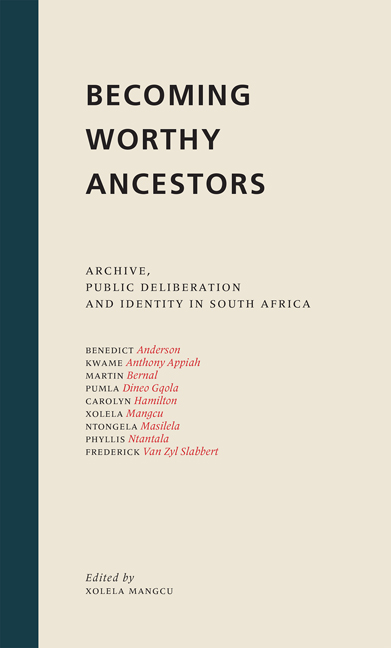Book contents
- Frontmatter
- Contents
- Preface
- Chapter One Evidentiary Genocide: Intersections of Race, Power and the Archive
- Chapter Two The Transmission Lines of the New African Movement
- Chapter Three Some Do Contest the Assertion That I Am An African
- Chapter Four Africa in Europe, Egypt in Greece
- Chapter Five Unconquered and Insubordinate: Embracing Black Feminist Intellectual Activist Legacies
- Chapter Six Identity, Politics and the Archive
- Chapter Seven The Goodness of Nations
- Chapter Eight Why Archive Matters: Archive, Public Deliberation and Citizenship
- Endnotes
- Index
Chapter Two - The Transmission Lines of the New African Movement
Published online by Cambridge University Press: 21 March 2018
- Frontmatter
- Contents
- Preface
- Chapter One Evidentiary Genocide: Intersections of Race, Power and the Archive
- Chapter Two The Transmission Lines of the New African Movement
- Chapter Three Some Do Contest the Assertion That I Am An African
- Chapter Four Africa in Europe, Egypt in Greece
- Chapter Five Unconquered and Insubordinate: Embracing Black Feminist Intellectual Activist Legacies
- Chapter Six Identity, Politics and the Archive
- Chapter Seven The Goodness of Nations
- Chapter Eight Why Archive Matters: Archive, Public Deliberation and Citizenship
- Endnotes
- Index
Summary
The duty of Bantu intellectuals is to create an intellectual awakening which will stimulate thought and set our faculties in motion. This can only be done by organisation, by lectures, debates, reading and writing. Therefore it is important that the educated men of our race should interest themselves in institutions whose aims and objects are the intellectual and spiritual development of the race.
Will our intellectuals be equal to this test? When time comes for constructive thinking and planning will our leaders give a lead on behalf of their people or will they, in turn, be led by the nose by leaders of other races who can be depended upon to seize any opportunity to speak for their followers? Time will show. But we fear that unless our intellectuals get into the sufferings of their people; and weave themselves into their unvoiced fears and anxieties they will never speak the feelings of the people.
THE NEW AFRICAN MOVEMENT AND ITS BEGINNINGS: FROM SOGA TO MQHAYI TO SEME
One fundamental issue encountered in the reconstruction of South African intellectual and cultural history in accordance with the newly emergent epistemic paradigm of the New African Movement is that of establishing a conceptual structure of its periodisation. With whom or with what governing idea should this periodising begin, and how should its end be determined? In his magisterial work Beginnings, Edward Said taught generations of postcolonial intellectuals and Third World scholars that the beginnings of intellectual processes are contentious force fields; similarly, in his brilliant book The Sense of an Ending, Frank Kermode has postulated the same observations regarding endings.
This was particularly true of the New African Movement, the foundation of which was made necessary by the making and construction of modernity in a context of political domination. Should its beginnings be identified with and demarcated through Pixley ka Isaka Seme who, in 1904, wrote a manifesto, ‘The Regeneration of Africa’, which unequivocally proclaimed that the beginning of the twentieth century would be the age of modernity in Africa – not only in South Africa – as well as the beginning of the decolonisation process from imperial and colonial domination?
- Type
- Chapter
- Information
- Becoming Worthy AncestorsArchive, Public Deliberation and Identity in South Africa, pp. 17 - 46Publisher: Wits University PressPrint publication year: 2011



